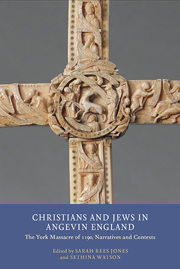Book contents
- Frontmatter
- Contents
- List of Illustrations
- Contributors
- Editor's Preface and Acknowledgments
- Abbreviations
- Introduction: The Moment and Memory of the York Massacre of 1190
- Part I The Events of March 1190
- 1 Neighbours and Victims in Twelfth-Century York: a Royal Citadel, the Citizens and the Jews Of York
- 2 Prelude and Postscript to the York Massacre: Attacks in East Anglia and Lincolnshire, 1190
- 3 William of Newburgh, Josephus and the New Titus
- 4 1190, William Longbeard and the Crisis of Angevin England
- 5 The Massacres of 1189-90 and the Origins of the Jewish Exchequer, 1186–1226
- Part II Jews among Christians in Medieval England
- Part III Representations
- Afterword: Violence, Memory and the Traumatic Middle Ages
- Bibliography
- Index
- York Medieval Press: Publications
3 - William of Newburgh, Josephus and the New Titus
from Part I - The Events of March 1190
Published online by Cambridge University Press: 05 May 2013
- Frontmatter
- Contents
- List of Illustrations
- Contributors
- Editor's Preface and Acknowledgments
- Abbreviations
- Introduction: The Moment and Memory of the York Massacre of 1190
- Part I The Events of March 1190
- 1 Neighbours and Victims in Twelfth-Century York: a Royal Citadel, the Citizens and the Jews Of York
- 2 Prelude and Postscript to the York Massacre: Attacks in East Anglia and Lincolnshire, 1190
- 3 William of Newburgh, Josephus and the New Titus
- 4 1190, William Longbeard and the Crisis of Angevin England
- 5 The Massacres of 1189-90 and the Origins of the Jewish Exchequer, 1186–1226
- Part II Jews among Christians in Medieval England
- Part III Representations
- Afterword: Violence, Memory and the Traumatic Middle Ages
- Bibliography
- Index
- York Medieval Press: Publications
Summary
The story that follows is to be read as an exercise in intellectual history, and in particular as an attempt to trace the debt owed not just by twelfth-century English chroniclers, but by English churchmen and kings, to the literary and historical traditions of a much more distant past. In pursuing this line of enquiry, I owe a special debt to two modern historians. The first, Barrie Doson, in his study of the York massacre of 1190, has identified the chief contemporary witness to these events, the Historia Rerum Anglicarum of William of Newburgh, as a ‘comparatively impartial and well-balanced if sometimes over-calculated’ source. The full extent to which Newburgh's account of the 1190 massacre is ‘over-calculated’ I shall in due course reveal. The second of my modern authorities is Peter Biller, whose study of Newburgh and the Cathars has revealed for the first time the extent to which Newburgh's historical writing was coloured by a profound familiarity with scripture and patristics, in this particular instance with Augustine, Jerome and Isidore writing on the heresies of the early Church.
To state my thesis very briefly, I intend, by close analysis of his language and lexical peculiarities, to demonstrate that Newburgh depended heavily in his account of the York massacre upon careful and deliberate citation both of the Vulgate of St Jerome, and of the standard Latin translation of the Bellum Judaicum of Josephus, widely circulated in twelfth-century England.
- Type
- Chapter
- Information
- Christians and Jews in Angevin EnglandThe York Massacre of 1190, Narratives and Contexts, pp. 57 - 90Publisher: Boydell & BrewerPrint publication year: 2013



